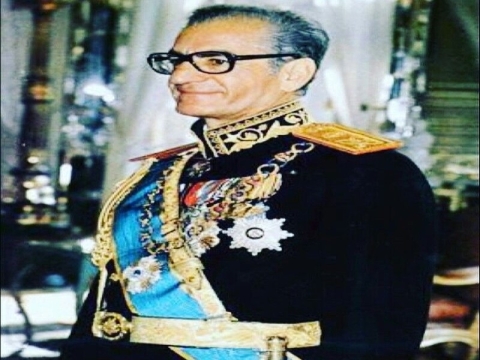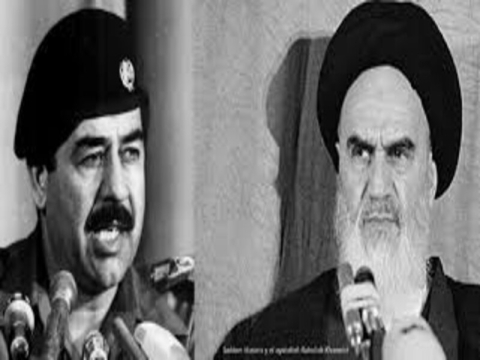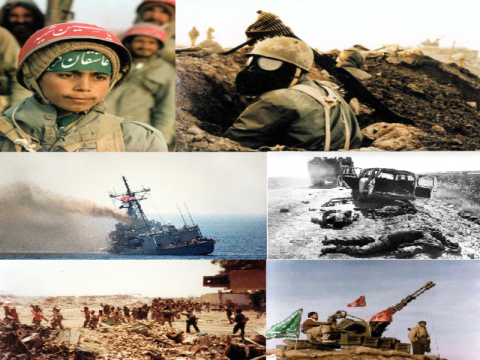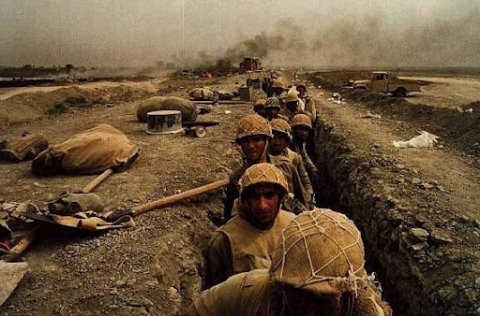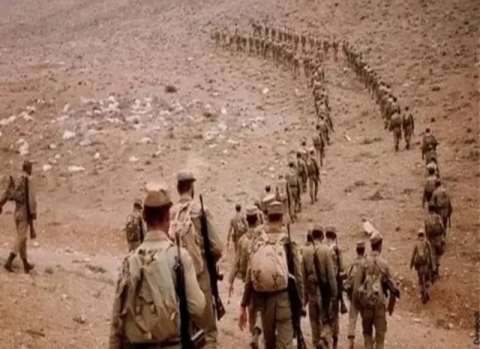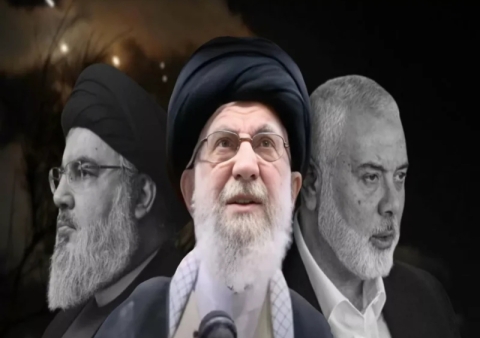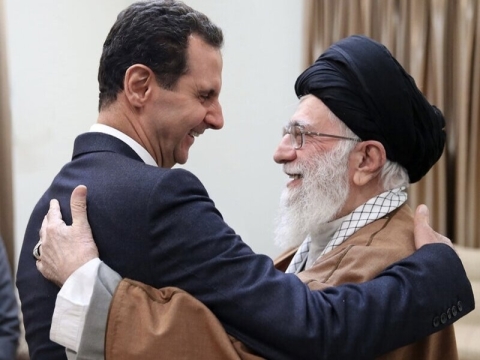Politics
Sometimes, only a few seconds remain until the fall.
Everything began in 1979.

The dominoes are in motion, leading to the fall of (Source: https://www.cartoonstock.com/directory/d/domino_st)
USPA NEWS -
The Turning Point of the Middle East: Reflections on February 11, 1979
The Middle East underwent a seismic shift on February 11, 1979, marking the fall of one of its most remarkable figures—His Majesty Mohammad Reza Shah Pahlavi.
A visionary leader, he was not just a king but a symbol of progress, intellect, and stability.
Under his reign, Iran flourished as the primary trade partner of the United States and Europe, a beacon of modernity, and a hub of cultural and economic growth. The Shah, deeply revered as one of the most popular monarchs in the history of the region, turned Iran into a model of security and prosperity.
His leadership elevated Iran to unprecedented heights, transforming it into a thriving commercial and tourism center.
Citizens enjoyed unparalleled freedom and quality of life. Iran became the first country in the region to grant women the right to vote, championing gender equality and inclusivity long before it was a global norm. It was a nation of diverse ethnicities and languages—Persian, Arabic, Turkish, Kurdish, Luri, and others—all coexisting in harmony.
Separatist sentiments were nonexistent, and the territorial integrity of Iran was safeguarded.
The Middle East underwent a seismic shift on February 11, 1979, marking the fall of one of its most remarkable figures—His Majesty Mohammad Reza Shah Pahlavi.
A visionary leader, he was not just a king but a symbol of progress, intellect, and stability.
Under his reign, Iran flourished as the primary trade partner of the United States and Europe, a beacon of modernity, and a hub of cultural and economic growth. The Shah, deeply revered as one of the most popular monarchs in the history of the region, turned Iran into a model of security and prosperity.
His leadership elevated Iran to unprecedented heights, transforming it into a thriving commercial and tourism center.
Citizens enjoyed unparalleled freedom and quality of life. Iran became the first country in the region to grant women the right to vote, championing gender equality and inclusivity long before it was a global norm. It was a nation of diverse ethnicities and languages—Persian, Arabic, Turkish, Kurdish, Luri, and others—all coexisting in harmony.
Separatist sentiments were nonexistent, and the territorial integrity of Iran was safeguarded.
But the Shah’s vision extended far beyond Iran’s borders. His policies brought peace and stability to the entire Middle East. From Israel and Syria to Iraq, Turkey, Azerbaijan, and the Gulf states, the region thrived without the shadow of war or discord. Neighboring nations owed much of their stability to the Shah’s diplomatic acumen and his efforts to foster unity and cooperation. The Middle East, once a bastion of peace and prosperity, was focused on progress, freedom, and the pursuit of happiness.
However, this era of unparalleled peace came to a sudden halt, replaced by chaos and unrest. The Shah, forced to leave his homeland, became a victim of ignorance and superstition. The people, blinded by populist rhetoric, handed their nation over to a figure devoid of vision and humanity—Ruhollah Khomeini. The result was catastrophic. Iran, a nation poised for greatness, descended into turmoil. The harmony that once defined the Middle East was shattered, and the region has yet to regain the stability it enjoyed under the Shah’s leadership.
However, this era of unparalleled peace came to a sudden halt, replaced by chaos and unrest. The Shah, forced to leave his homeland, became a victim of ignorance and superstition. The people, blinded by populist rhetoric, handed their nation over to a figure devoid of vision and humanity—Ruhollah Khomeini. The result was catastrophic. Iran, a nation poised for greatness, descended into turmoil. The harmony that once defined the Middle East was shattered, and the region has yet to regain the stability it enjoyed under the Shah’s leadership.
This chapter in history serves as a stark reminder of what was lost—a peaceful, thriving Iran, and a Middle East united by the values of progress, cooperation, and freedom.
The Bitter Reality of the Middle East: A Journey into Fear and Chaos
On December 2, 2024, we find ourselves witnessing a tragic narrative that defines the lives of many in the Middle East. For over a decade, the people of Syria have endured an unrelenting crisis. Since 2011, their days are steeped in worry, and nights are shadowed by fear—fear of war, destruction, and death. Israel, a nation with a rich culture and a shared historical connection with Iran, as mentioned in the Torah, has not remained untouched by regional chaos. Neighboring countries like Iraq, Lebanon, and even Palestine have also suffered under the weight of turmoil fueled by Ayatollahs, sectarian conflicts, and unending wars.It is my belief that no nation can thrive when its citizens are forced to sleep in fear, haunted even once by the sound of war sirens. Such experiences fragment societies and leave deep psychological scars. This reality resonates sharply with the people of Iran, who, after the Shah’s fall, faced the tyranny of Ruhollah Khomeini and the brutal aggression of Saddam Hussein. For eight harrowing years, Iranians endured war and unrest, only to fall deeper into the grip of Khomeini’s oppressive regime.
Khomeini’s rule marked the rise of extremist Shia militias, many of whom originated from Lebanon, forming the foundation of the Iranian Basij militia. These forces were unleashed not to protect but to suppress—targeting Iranian men and women who opposed Khomeini’s domestic and foreign policies. From senselessly prolonging the war with Iraq to enforcing mandatory hijabs for women and executing dissenters, Khomeini’s regime left no room for opposition. Religious minorities, including Baha’is, Christians, Zoroastrians, and even Sunni Muslims, who comprise an estimated 40% of Iran’s population, faced systematic discrimination and exclusion.
The decay did not stop at political oppression; it seeped into the fabric of Iranian society. Schools became instruments of indoctrination, where children—who neither knew the location of Israel on a map nor understood the complexities of America—were forced to chant slogans of hatred. “Death to this” and “Death to that” became their daily mantra, replacing curiosity and hope with fear and bigotry.
This cycle of imposed hostility stunted their potential and eroded the very essence of freedom and dignity.
This tragic tale ties back to the Shah’s era of peace and progress, making the contrast all the more jarring.
What was once a region striving for prosperity has become a cauldron of fear, division, and suffering.
Yet, in reflecting on the past, we are reminded of what could be—a return to peace, unity, and the pursuit of happiness.
As we delve deeper into this narrative, one cannot help but question:
how did a region that once symbolized coexistence and progress descend into such chaos?
And more importantly, is there still a way back to the harmony it once knew?
What was once a region striving for prosperity has become a cauldron of fear, division, and suffering.
Yet, in reflecting on the past, we are reminded of what could be—a return to peace, unity, and the pursuit of happiness.
As we delve deeper into this narrative, one cannot help but question:
how did a region that once symbolized coexistence and progress descend into such chaos?
And more importantly, is there still a way back to the harmony it once knew?
The Awakening of the West: A Reckoning with Iran’s Regime
For decades, it seemed as though Western nations were trapped in a winter slumber, oblivious to the true nature of Iran’s regime.However, they now appear to be awakening to a stark reality: the Islamic Republic is not a government with which one can easily negotiate.
The resilience of the Iranian people, steadfast in their refusal to see their country divided, coupled with Iran’s vast wealth of resources—oil, gas, gold, copper, and countless other riches—has finally captured the attention of the global stage.
Perhaps the time has come for the West to take decisive action, to offer unwavering support to dismantle the monstrous entity known as the Islamic Republic.
The turning point came with the elimination of one of the most notorious figures in modern history: Qasem Soleimani.
Thanks to the bold decision of former U.S. President Donald Trump, the death of Soleimani not only removed a key architect of regional chaos but also saved countless civilian lives. His demise brought a brief but significant respite to the Middle East, creating a flicker of hope for a more stable region.
Yet, the battle was far from over.
Figures like Hassan Nasrallah, the leader of Hezbollah, and militant groups such as the Houthis in Yemen, along with extremists like Ismail Haniyeh, continued their campaigns of terror. These individuals, driven by a lust for power and destruction, have masterminded countless atrocities, claiming the lives of innocent men, women, and children.
Figures like Hassan Nasrallah, the leader of Hezbollah, and militant groups such as the Houthis in Yemen, along with extremists like Ismail Haniyeh, continued their campaigns of terror. These individuals, driven by a lust for power and destruction, have masterminded countless atrocities, claiming the lives of innocent men, women, and children.
Meanwhile, another dictator, Bashar al-Assad of Syria, whose hands are stained with the blood of thousands of Syrian youth, clings to power. His survival has prolonged a nightmare for millions, but recent events suggest a glimmer of hope. A domino effect of change seems to be in motion, signaling the potential downfall of tyrants who have long plagued the region.
For Iranians, the death of Hassan Nasrallah, a symbol of oppression, was a moment of collective relief—a rare cause for celebration in recent memory. Similarly, for both Iranians and Syrians, the collapse of Bashar al-Assad’s regime would represent a monumental victory. The end of Assad’s reign would not only bring an era of peace to Syria but also ripple across the region, providing much-needed stability and a chance to rebuild shattered nations.
This hope stems from a profound belief: the tyranny of oppressors is never eternal. History has shown that the cries of the oppressed eventually shatter even the most unyielding chains.
The people of Iran and Syria know that the downfall of figures like Assad is not merely symbolic—it is a necessary step toward reclaiming their nations and ensuring that future generations can live free from the shadow of war and bloodshed.
As the world watches, the question remains: will the West seize this opportunity to stand firmly against tyranny, or will it allow the region to endure further suffering?
One thing is clear—there is no greater justice than witnessing the fall of those who have caused immeasurable pain and suffering.
And in the hearts of millions, a quiet but resolute hope persists: that light will one day overcome darkness, and peace will return to the lands that have yearned for it for far too long.
The Shifting Tides: The Path to Freedom for Iran and the Middle East
In these turbulent times, economic stability in Iran has completely collapsed. Inflation is so high that it harms people’s lives not only on a daily but on an almost minute-to-minute basis. The Iranian people are being deprived more and more of the basic means to live, as every moment brings them further away from even the minimum standard of living. Meanwhile, brave fighters in Syria are working tirelessly to reclaim their country, and with the collapse of Hezbollah, Israel’s growing strength has made the regime of the madmen led by Ayatollah Khamenei more fragile and vulnerable than ever.Let us not forget that the billions of dollars invested by the Ayatollahs in attempts to instigate chaos in the region after October 7, 2023, through aggression against Israel, have been completely wiped out. The near-total destruction of Hamas terrorists and the fall of Hezbollah have not only brought hope but also joy to the hearts of Iranians, Lebanese, Syrians, Iraqis, and Yemenis. These groups have only one key source of support: the Islamic Republic of Iran. The fall of each of them brings more light and freedom not only to the people of Iran but to the entire region.
This hope is so profound that perhaps the people of Iran are more eager than ever to hear the news.
Without a doubt, the ultimate news would be the fall of Bashar al-Assad, which is the greatest hope for both the people of Iran and Syria these days.
It would undoubtedly be the best news for humanity, ushering in stability and peace not only in the Middle East but for the entire world.
This domino effect has already begun, and undoubtedly, it will eventually reach the regime’s head: Ali Khamenei, the current Supreme Leader of Iran, who has sacrificed his life for delusions and fantasies and believes he is sent by God. The Islamic Republic no longer has the power to even keep its people’s homes warm, provide gas, or supply electricity. The regime is more fragile than ever, and everyone knows that the Iranian people are courageous and fearless. More importantly, they are deeply aware. This awareness was demonstrated when they chose not to participate in the two fraudulent elections of the regime after Raisi’s election. According to official internal data, 80% of Iranians did not participate in the recent presidential election, reflecting not only the awareness of the people but also sending one of the biggest signals to Western countries: they understand that, no matter the price—no matter how costly, even if it means the blood of their own people—they will no longer tolerate oppression. They want a free Iran.
For their salvation, the world must act swiftly.
For their salvation, the world must act swiftly.
After the potential fall of Assad, countries worldwide must expand their support for the Iranian people, understanding that the absence of a mad regime like the Islamic Republic is in the best interest of all humanity. I firmly believe that these countries have now come to realize this, and they understand that the leverage the Islamic Republic once had is no longer effective.
For example, the psychological pressure exerted on refugees and asylum seekers residing in Western countries is no longer sufficient. Iranians in exile would rather face death at the hands of the murderous and inhumane regime than allow these bizarre entities to remain in power. In reality, the Iranian people are only asking for a little more patience and support. Without a doubt, they will continue their journey towards freedom and will take the necessary steps to achieve it.
This is the crucial moment—one that could change the course of history.
For example, the psychological pressure exerted on refugees and asylum seekers residing in Western countries is no longer sufficient. Iranians in exile would rather face death at the hands of the murderous and inhumane regime than allow these bizarre entities to remain in power. In reality, the Iranian people are only asking for a little more patience and support. Without a doubt, they will continue their journey towards freedom and will take the necessary steps to achieve it.
This is the crucial moment—one that could change the course of history.
It is important that we know where we stand in history
This text is not a news report, but an analysis written with the sole purpose of being recorded in history. My aim is to prevent future generations from repeating the mistakes, superstitions, and ignorance that have plagued several generations. This piece is meant to raise awareness for future generations, so they can learn from past experiences and avoid repeating past mistakes.Today, while the people of Iran and the region face blatant and painful oppression from the Islamic Republic regime, wars, and the dictatorship imposed on their lives, we must step forward and act not only for humanity but also for stability, peace, and progress. We must stand with the people who are paying the price for the mistakes of their ancestors, and who face daily battles with the monster of the Islamic Republic in Iran, the dictatorship of Bashar al-Assad, and the leadership of Ali Khamenei.
If we neglect this golden opportunity and do not confront the Islamic Republic of Iran, the world could face even greater threats. With the support of Russia and China, the Islamic Republic could become a dangerous country for all of humanity. At this time, global support for the people of Iran and other countries under oppression in the Middle East could lead to the creation of a safer, war-free world.
We can support this by sending letters to governments, requesting them to sever ties with the Islamic Republic of Iran and apply pressure on the officials of this regime. By emphasizing the importance of international monitoring and sanctions, we can isolate this regime.
Imagine a day when you hear in the news that Iran has been freed, the Islamic Republic has fallen, and the king of Iran, a descendant of the late Shah, has returned. This news would be uplifting not only for the people of Iran but for all people around the world. Iran would no longer need to enrich uranium, and instead, it would announce its readiness for reconstruction.
New job opportunities would be created for the people of Iran, and international brands would enter the Iranian market.
We can support this by sending letters to governments, requesting them to sever ties with the Islamic Republic of Iran and apply pressure on the officials of this regime. By emphasizing the importance of international monitoring and sanctions, we can isolate this regime.
Imagine a day when you hear in the news that Iran has been freed, the Islamic Republic has fallen, and the king of Iran, a descendant of the late Shah, has returned. This news would be uplifting not only for the people of Iran but for all people around the world. Iran would no longer need to enrich uranium, and instead, it would announce its readiness for reconstruction.
New job opportunities would be created for the people of Iran, and international brands would enter the Iranian market.
It is fact
This is the dream that, with our solidarity and support, can become a reality.The idea that everyone should contribute to the prosperity and peace of their own country represents a unique opportunity for progress. By fostering job opportunities in a stable country and supporting social development, we are not only advancing the well-being of one nation but benefiting humanity as a whole.
A brighter future, fueled by hope and global unity, is within our reach. We must stand together, showing solidarity with the oppressed people of these nations, supporting their quest for freedom and human rights. By keeping this vision alive, we will not only ensure that history is on the side of these people but that it serves the best interest of all humanity.
I hope this article serves as a call to action, inspiring everyone who reads it to think critically and take meaningful steps. Together, we have the power to shape a world defined by freedom, peace, and justice for all.
And without a doubt, these dark periods in societies have led to historical flourishing. For example, after the French Revolution, despite the turmoil, France emerged as a beacon of democracy, human rights, and social change, influencing many nations around the world. Similarly, the industrial revolution, which began in England amidst challenging and often oppressive conditions, ultimately paved the way for global economic and technological progress. These moments of hardship and transformation have often been the catalyst for significant breakthroughs in human history.
As we face the challenges of today, it is important to remember that these struggles have not only shaped societies but also led to the creation of better systems, greater freedoms, and improved opportunities for future generations. We stand at the threshold of a new era, one where we can contribute to the creation of a more peaceful, prosperous world for all. By supporting the oppressed and standing for justice, we can help begin a new chapter of hope and progress. Together, we can be the initiators of a new dawn for peace.
As we face the challenges of today, it is important to remember that these struggles have not only shaped societies but also led to the creation of better systems, greater freedoms, and improved opportunities for future generations. We stand at the threshold of a new era, one where we can contribute to the creation of a more peaceful, prosperous world for all. By supporting the oppressed and standing for justice, we can help begin a new chapter of hope and progress. Together, we can be the initiators of a new dawn for peace.
Liability for this article lies with the author, who also holds the copyright. Editorial content from USPA may be quoted on other websites as long as the quote comprises no more than 5% of the entire text, is marked as such and the source is named (via hyperlink).

